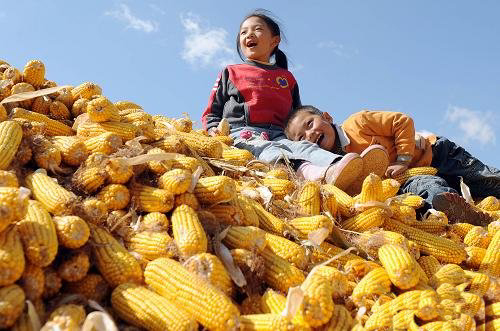Why and How the CPC Works in China
 0 Comment(s)
0 Comment(s) Print
Print E-mail
China.org.cn, June 30, 2011
E-mail
China.org.cn, June 30, 2011
Food is the lifeline of the Chinese people
China is a huge country in the East with a civilized history of 5,000 years. Its people were the first in the world to select grains as their food. Archaeological findings available now show that as early as over 5,000 years ago rice and millet were planted in China, which was an example for the development of world agricultural civilization over a long period of time. Even when the Industrial Revolution was launched in Britain in the 18th century, China was still in the forefront of the world economy. However, people would learn from the civilized history of China that this ancient Eastern country had suffered enough from various disasters such as drought and flood. The rulers of successive Chinese dynasties had always been plagued by the haunting question of how to feed the people.
A white paper issued by the US Department of State in 1948 stated that China had an excessively huge population; the failure to feed large populations had led to the downfall of the KMT as well as all the previous dynasties of China; and the CPC would finally come to an end because it could not address the same issue either. This statement by Dean Acheson, US secretary of state, was true of the KMT, but it did not hold true of the CPC.
To refute this claim, Mao Zedong, the top leader of the CPC, wrote five articles in succession. A famous quotation from one of them goes: "Of all things in the world, people are the most precious. Under the leadership of the Communist Party, as long as there are people, every kind of miracle can be worked." The land is the lifeline of the peasants. An important reason why the CPC has been able to stay in power is that it early on addressed the issue of peasants' land ownership within the regions under its control. As the peasants had land to plant and food to eat, the CPC won the support of the absolute majority of the Chinese population.
After winning political power, the CPC initiated the movement of redistributing land nationwide. The peasants' enthusiasm was further enhanced, and the agricultural productive forces were emancipated. Within just four years, China's grain output reached 166.83 million tons in 1953, breaking the historical record of 150 million tons in 1936. Later the CPC and the Chinese Government launched large-scale farmland and water conservancy capital construction. Success in harnessing floods contributed to the continued growth in grain output year by year.
To further address the food issue, the CPC and the Chinese Government formulated the policy of "taking grain as the key link." Mao Zedong himself attended to the issue of grain production, and proposed the "Eight-Point Charter for Agriculture (soil improvement, rational application of fertilizer, water conservancy, improved seed strains, rational close planting, plant protection, field management and improvement of farm implements)," which was widely promoted. However, with the implementation of the system of people's communes, the land became the property of the communes, and the peasants had to farm in a collective way, which dampened their enthusiasm for production and caused a sharp decline in grain output, and even resulted in starvation in some places. Fortunately, Mao Zedong and his colleagues soon realized the gravity of the food issue, and began rectifying the mistakes in agricultural policy.
In 1976, the year Mao Zedong passed away, China's grain output reached 286.31 million tons, more than twice that of 1949. However, China's population had increased rapidly as well, offsetting the increase in grain output. The CPC was still under heavy pressure to deal with the food issue.




